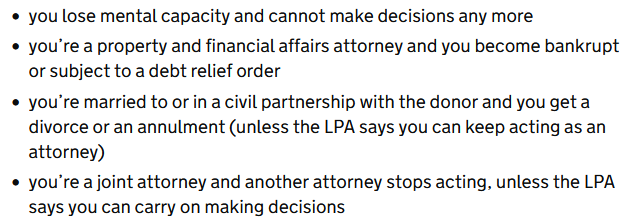When an attorneyship might end due to factors outside the control of either donor or attorney
In this blog, the last of a series focusing on how an attorneyship may end, I set out how the role of an appointed attorney may end due to what I’ll call factors outside the control of either the donor or attorney. It could be argued that some of the examples I give are under the control of the donor or attorney, but I am talking more broadly and approaching this from factors not instigated by a donor or attorney with the primary intent of ending an attorneyship. You can access the previous blogs Can I stop being an attorney? and Can I remove an attorney from a Lasting Power of Attorney? which look at how an attorney revokes their role and how a donor may remove an attorney respectively.
I’ll start be setting the scene, as in the previous blogs, explaining a Lasting Power of Attorney, I’ll then briefly cover how to stop being an attorney and how to remove an attorney. Lastly, I’ll moving identify reasons an attorneyship might end due factors outside the control of either the donor or attorney.
What is a Lasting Power of Attorney?
A Lasting Power of Attorney (LPA) is a legal document that lets a person appoint one or more people to make decisions on their behalf. This gives more control over what happens if a person has a sudden accident, illness or a long-term health condition and cannot make their own decisions.[i] The people appointed to make decisions are called attorneys and the person making a Lasting Power of Attorney is called the donor.
There are two different types of Lasting Power of Attorney, one for Health and Welfare and one for Property and Finance; I have blogged about how to make a Lasting Power of Attorney previously and you can find out more here.
How to stop being a donor
A donor can decide to remove themselves from a Lasting Power of Attorney by “disclaiming an attorneyship”. If a donor decides to disclaim their attorneyship they will need to complete and send the form LPA005
You can access more details in the blog Can I stop being an attorney?
How a donor can remove an attorney
To remove an attorney from a registered Lasting Power of Attorney the donor must complete a “partial deed of revocation”. You will find guidance about the wording required on the GOV.UK website here.
You can access more details in the blog Can I remove an attorney from a Lasting Power of Attorney?
When an attorneyship may end due to factors outside control of attorney of donor
The Office of the Public Guardian sets out when the role of an attorney must stop and lists factors that I have not already explored from the attorney or donor perspective; in other words, external factors which I am addressing in this blog.
Factors which will stop an attorney from acting:
Why is it important to know this?
It may seem counter-intuitive to look at stopping being an attorney when so much if what I promote is proactive Advance Care Planning, including having a Lasting Power of Attorney in place. I believe it is important to understand how the role of an attorney may end right at the beginning of making a Lasting Power of Attorney because it could influence how the document is drafted; there could be discussions, for example, about replacement attorneys or consideration about specific wording on a Lasting Power of Attorney.
It is also important to know that, even once a Lasting Power of Attorney has been registered, attorneyship can be made ended by an attorney or donor.[i] This is part of all discussions that should be included when creating the Lasting Power of Attorney and set out in section 8 of the Lasting Power of Attorney document which focuses on legal right and responsibilities.
Final thoughts
I hope this series of blogs focusing on how and when an attorney’s role may end has been useful in providing information for people with a Lasting Power of attorney in place and those seeking to make a Lasting Power of Attorney. Understanding the implications of having a single attorney, considering how multiple attorneys can act and knowing what could happen in the event of life changing events such as divorce, ending a civil partnership or bankruptcy are all considerations when creating a Lasting Power of Attorney.
If the blog has helped you or provided information and you would like to support my ongoing work, head to Buy me a coffee – thank you!
If you have any questions or would like to enquire about drafting a Lasting Power of Attorney contact me
[1] It is possible, under a Property and Finance Lasting Power of Attorney, for a donor to consent for a Lasting Power of Attorney to be used when registered by the Office of the Public Guardian. A Health and Welfare Lasting Power of Attorney can ONLY be used when a donor loses capacity to make health and welfare decisions.
[1] The donor or attorney must have capacity to make these decisions



